
Cola is a carbonated soft drink flavored with vanilla, cinnamon, citrus oils, and other flavorings. Cola became popular worldwide after the American pharmacist John Stith Pemberton invented Coca-Cola, a trademarked brand, in 1886, which was imitated by other manufacturers. Most colas originally contained caffeine from the kola nut, leading to the drink's name, though other sources of caffeine are generally used in modern formulations. The Pemberton cola drink also contained a coca plant extract. His non-alcoholic recipe was inspired by the coca wine of pharmacist Angelo Mariani, created in 1863.
7 Up or Seven Up is an American brand of lemon-lime–flavored non-caffeinated soft drink. The brand and formula are owned by Keurig Dr Pepper, although the beverage is internationally distributed by PepsiCo except the UK where it is distributed by Britvic, PepsiCo's designated UK distributor.

Crush is a brand of carbonated soft drinks owned and marketed internationally by Keurig Dr Pepper, originally created as an orange soda, Orange Crush. Crush competes with Coca-Cola's Fanta. It was created in 1911 by beverage and extract chemist Neil C. Ward. Most flavors of Crush are caffeine-free.

Sun Drop is a citrus-flavored soft drink produced by Keurig Dr Pepper with a yellowish-green color. Among soft drinks, it is known for its high caffeine content. Orange juice concentrate is an ingredient in the drink. Bottled Sun Drop uses real sugar cane, which contains some "pulp" giving Sun Drop it's distinct flavor and appearance. Sun Drop competes primarily against the Coca-Cola Company's Mello Yello and PepsiCo's Mountain Dew.
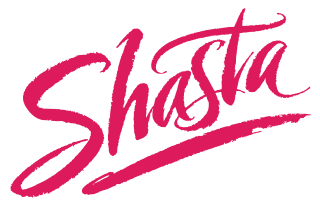
Shasta Beverages is an American soft drink manufacturer that markets a value-priced soft drink line with a wide variety of soda flavors, as well as a few drink mixers, under the brand name Shasta. The company name is derived from Mount Shasta in northern California and the associated Shasta Springs.

Slice was a line of fruit-flavored soft drinks originally manufactured by PepsiCo and introduced in 1984 but discontinued by PepsiCo in North America in the late 2000s.

Polar Beverages is a soft drink company based in Worcester, Massachusetts. It is a manufacturer and distributor of sparkling fruit beverages, seltzer, ginger ale, drink mixers, and spring water to customers in the United States. It is the largest independent soft-drink bottler in the United States.
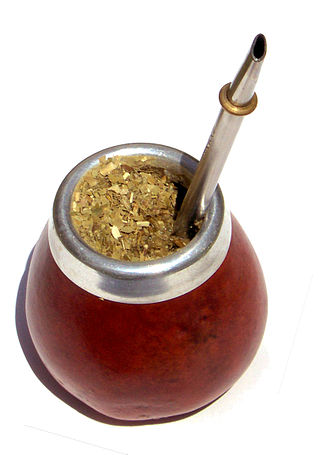
Maté is a traditional South American caffeine-rich infused herbal drink. It is also known as chimarrão in Portuguese, cimarrón in Spanish, and kaʼay in Guarani. It is made by soaking dried yerba-maté leaves in hot water and is traditionally served with a metal straw in a container typically made from a calabash gourd, but also made from a cattle horn in some areas. A very similar preparation, known as mate cocido, removes some of the plant material and sometimes comes in tea bags. Today, maté is sold commercially in tea bags and as bottled iced tea.
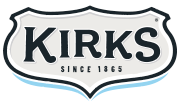
Kirks is a soft drink manufacturer founded in Queensland, Australia in 1865, producing a selection of soft drink flavours.

Blue Sky Beverage Company was a beverage company that produced soft drinks and energy drinks. It is a wholly owned subsidiary of the Monster Beverage Corporation. The company was established in Santa Fe, New Mexico, in 1980, where it remained until it was purchased by Monster in 2000. Coca-Cola North America took ownership of Blue Sky Sodas, Hansen’s Juice Products, Hansen’s Natural Sodas, Hubert’s Lemonade, Peace Tea and other non-energy drink brands as part of Coke’s partnership with Monster Beverage Corp on Jun 12, 2015. Blue Sky Beverage Company now operates out of Corona, California. The southwestern look and feel of the artwork on the soda cans is reminiscent of the company's roots in New Mexico.

Filbert's Old Time is a beverage company based in Chicago, Illinois. Since 1926, it has bottled and distributed soft drinks as well as non-carbonated beverages. The warehouse is located on 3430 S Ashland Ave, Chicago, IL 60608.

Jarritos is a brand of soft drink in Mexico, owned by Novamex, a large independent bottling conglomerate based in El Paso, Texas. Jarritos was founded in 1950 by Don Francisco "El Güero" Hill.

Cawy Bottling Company is a soda beverage company founded in Cuba in 1948 and nationalized after the Cuban Revolution when communists took over in 1959. Two of the company's executives emigrated to the U.S. and restarted the brand in 1962, first offering lemon-lime soda and then diversifying outside of that competitive market by offering Materva and then other tropical flavors.
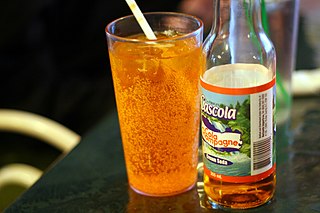
Champagne cola, Kola Champagne, or Champagne soda is a sweetened carbonated beverage produced mainly in the tropics of Latin America, former British West Indies, and Pakistan. Kola Champagne was invented in Puerto Rico by Ángel Rivero Méndez. Rivero Méndez was a Captain in the Spanish Army during the Spanish–American War. In 1902, a few years after the end of the Spanish-American War, Rivero Méndez founded El Polo Norte Fábrica de Sodas where he created the Kola Champagne, which became, and still is, a popular soft drink in Puerto Rico. While elaborating the drink he worked on his book, Chronicle of the Spanish-American War in Puerto Rico.
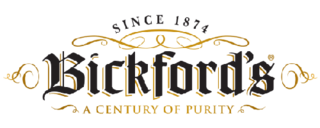
Bickford's Australia Pty. Ltd. is an Australian beverage manufacturer based in South Australia. The brand produces traditional cordials, soft drinks, and iced coffee mix originally manufactured by A. M. Bickford & Sons, a pharmaceutical chemist founded by Anne Margaret Bickford in 1864. In 1999, the brandname was acquired by the Kotses family and later renamed Bickford's Australia, after which the brand saw a revival in popularity with the introduction of new flavours and products. In 2006, Bickford's lime juice cordial was recognised by the National Trust of South Australia as a Heritage Icon.














